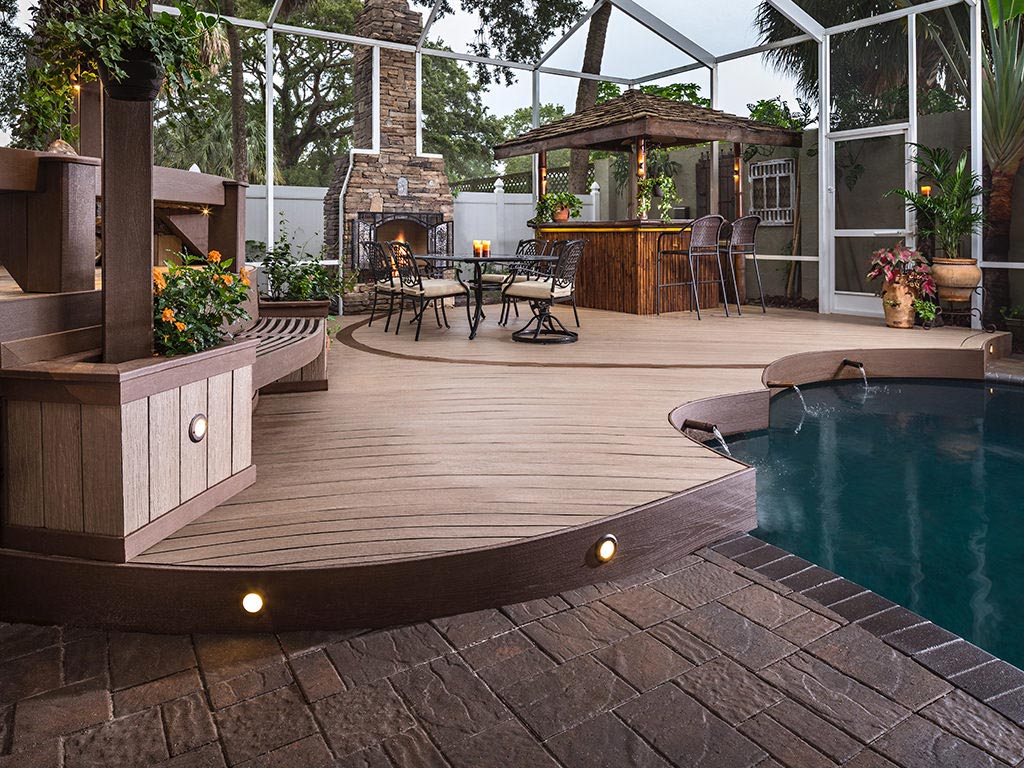Just how to Select the Right Materials for Your Deck Setup Job
Choosing the ideal materials for your deck installment task can appear daunting. There are countless aspects to think about, from toughness and maintenance to looks and ecological influence. The selection between typical wood and composite materials, each with its own set of advantages and disadvantages, can be particularly difficult. The key is to balance your budget plan, style preferences, and way of life needs to create a deck that will improve your exterior space for several years ahead.
Understanding the Various Sorts Of Deck Materials
When embarking on a deck installation project, the choice of products becomes a critical decision. Compound products, on the various other hand, are a blend of wood and plastic, offering resilience and resistance to weather elements. By recognizing these differences, house owners can make an extra enlightened choice on the most suitable deck material for their particular requirements.
Examining the Longevity and Maintenance Needs of Deck Products
Evaluating the resilience and upkeep demands of deck products is an important step in deck installment. Durability includes the product's ability to stand up to severe climate problems, wear and tear, and its longevity.
Understanding upkeep requirements is equally essential. Some products call for normal securing or discoloring to preserve their appearance and stand up to moisture damage, while others, like composite outdoor decking, require less upkeep. By evaluating these factors, one can choose the most suitable outdoor decking material, guaranteeing a balance in between toughness, upkeep requirements, and visual appeal.
Expense Evaluation: Contrasting Wood and Compound Decking
Although cost may at first appear like a second problem, it is a considerable element when comparing timber and composite decking. On the various other hand, composite decking, while costlier at first, calls for less upkeep, potentially lowering long-lasting prices. Prospective deck proprietors must consider their spending plan and determination to keep their decks when choosing in between timber and composite decking.
Aesthetics and Style Adaptability of Decking Materials
While price is a vital consideration, the visual appeal and layout versatility of outdoor decking products also play a considerable duty in the decision-making process. Different materials use differing levels of aesthetic charm. For circumstances, all-natural wood decking offers a timeless, classic look, while composite materials provide a wide variety of shades and textures to suit diverse tastes and styles. Design flexibility refers to the ability to shape and manipulate the outdoor decking product to fulfill certain style demands. Wood, as an example, offers high layout adaptability because of its simplicity of cutting and shaping. Compound products, while less flexible in layout, are still adaptable enough for most deck layouts. These aspects, as a result, are important factors in the choice of outdoor decking material.
Environmental Influence of Decking Materials
When picking decking products, one should take into consideration not only aesthetics and longevity, but additionally the environmental influence. It's vital to evaluate the sustainability of materials and check out recycled outdoor decking options. Recognizing the potential impact on regional ecological communities will certainly ensure a much more ecologically liable selection.
Assessing Material Sustainability
In the realm of deck building and construction, analyzing product sustainability is an important action. This includes examining the ecological influence of each possible product, taking into consideration factors such as the energy required for its production, its carbon footprint, and its end-of-life disposal or recycling options. For example, wood is a renewable energy, yet unsustainable logging practices can lead to logging. Additionally, composite decking products often incorporate timber and plastic, lowering the need for new wood but increasing dependence on fossil gas. Aluminum and other steels may be more sturdy and recyclable, however their extraction and handling can be energy-intensive. Therefore, the option of decking products must balance capability, visual appeals, cost, and sustainability to ensure a liable and long-lasting setup.
Recycled Outdoor Decking Choices

Compound outdoor decking is especially popular due to its sturdiness and ease of upkeep. Recycled plastic decking, on the various other hand, is extremely resistant and needs very little upkeep.

Effect On Local Ecosystems
While the benefits of using recycled great site products for outdoor decking can not be overstated, it's just as essential to take into consideration the wider ecological ramifications of these selections. Proper disposal of old outdoor decking is crucial to reducing landfill waste. Basically, an eco-conscious deck task needs mindful material option, sustainable sourcing, and liable disposal.
Making Your Decision: Tips for Selecting the Finest Deck Products
As the short article shifts right into the subtopic of "Making Your Final Decision: Tips for Picking the most effective Deck Materials", it is crucial to comprehend the selection of deck materials available. Striking a balance between durability and aesthetics is essential in this choice procedure. The adhering to conversation will direct visitors in making an enlightened selection based upon these essential considerations.
Understanding Different Deck Materials
The job of selecting click for info the appropriate materials for your deck installation can seem daunting due to the huge range of choices available. Vinyl or PVC decks look at these guys are also much more sturdy and need much less maintenance than composite products, yet they can look less all-natural. Aluminum decks are strong, light-weight, and resistant to rot, however they are additionally the most expensive choice.
Resilience vs. Aesthetics Balance
Stabilizing resilience with looks can be a challenge when choosing deck products. The choice frequently boils down to individual choices and the deck's intended use. High-traffic areas may require sturdy materials like composite decking, which endures damage yet might lack the all-natural beauty of timber. On the other hand, timber provides an ageless allure and warmth that synthetic materials battle to duplicate. However, it calls for extra upkeep and may not last as long. Home owners require to strike a balance, taking into consideration both the deck's functional demands and their aesthetic choices. By doing so, they can ensure their deck continues to be a functional and attractive outdoor space for several years ahead.
Verdict
In final thought, picking the right products for your deck setup project calls for mindful consideration of factors such as resilience, upkeep, price, aesthetics, and environmental impact. Whether you choose typical wood or composite materials, your choice ought to line up with your spending plan, layout choices, and lifestyle. Ultimately, the most effective decking material is one that improves your outside area and supplies satisfaction for years to come.